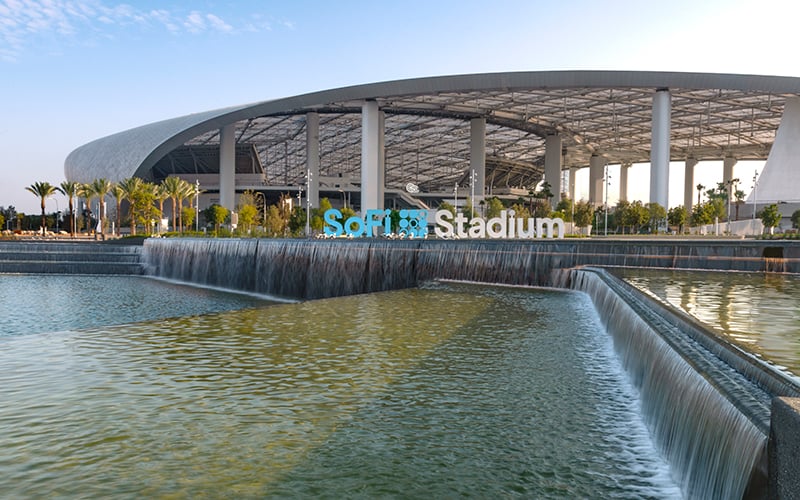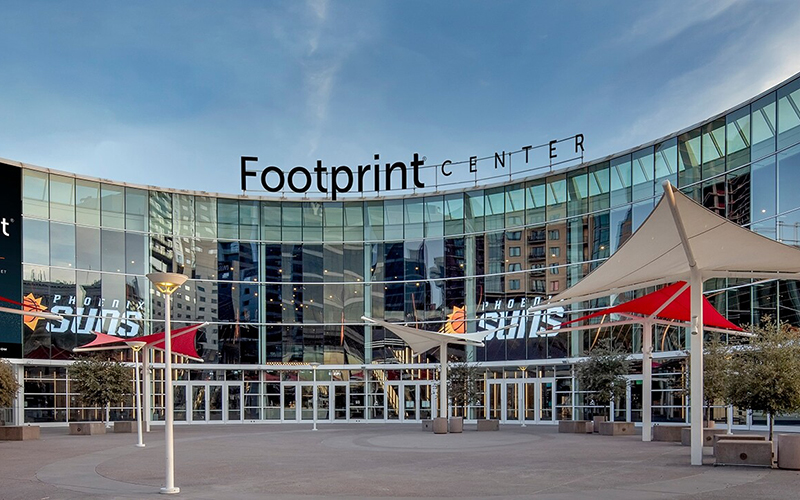LOS ANGELES – SoFi Stadium, the new home of the NFL Rams and Chargers, was designed with sustainability in mind when landscaping around the building and at Hollywood Park.
Kush Parekh, landscape architect, designed artificial lake to hold 100% recycled water, using it to water greenery around the stadium in Inglewood. The design also utilizes natural wetlands and mechanical systems to filter runoff.
“We’re using reclaimed water in a partnership with West Basin,” a public agency that provides water supply, said Chan Onechanh, vice president of engineering and transportation for SoFi Stadium and Hollywood Park. “We have 27 reclaimed water connections here on-site, and then we used that reclaimed water to kind of irrigate our landscapes.”
The extraordinary landscape outside of the stadium, which is called Hollywood Park, will be open to the public year round, offering visitors a 25-acre park with trees, walkways and places to sit and take it all in. A stage for outdoor performances and a 2.5 acre plaza border a tremendous lake.
Not only is the 6-acre lake environmentally friendly, it’s beautiful. Holding about 11 million gallons of water, it features a 12-foot-tall waterfall that cascades into two 4-foot waterfalls, Onechanh said.
The lake also collects stormwater.
“When there is a rain event, the (lake is) able to capture almost 70 to 80% of the site’s stormwater,” said Kush Parekh, associate principal at Studio-MLA and head landscape architect for SoFi Stadium. “Both of these sources not only capture and filter the water through natural wetlands and mechanical systems, but they are also able to reuse it for the park’s irrigation purpose.”
Inglewood receives about 15 inches of rain a year, according to weatheranclimate.com.
Experts say water recycling is essential to lowering demand at a time when the Southwest is growing and steadily getting hotter and drier.
“Water recycling in the long term is very important because it is necessary for our state to develop water recycling projects to mitigate the impacts of climate change,” said Jennifer West, managing director of WateReuse California, a trade association dedicated to recycling water.
This was one of the main things on the minds of the team responsible for SoFi Stadium.
“I think the offset of potable water usage is really important, if you’re talking about the immediate impact of water reusage,” Onechanh said. “So rather than filling it with drinking water, we are using reclaimed water that normally we wouldn’t be able to consume.”
However, he said, it is safe for the wildlife living in the environment around the stadium – although he would not recommend people swimming in it or drinking it.
Stadiums across the country have faced criticism in the past for a high volume of waste and other sustainability issues.
The average amount of waste generated by sporting events is “around 39 million pounds” a year, according to a 2014 study by the Environmental Protection Agency.
After COVID-19 delayed the opening last year, SoFi Stadium and Hollywood Park finally will debut this summer. It will be on the global stage during the Olympic games in 2028, when the venue will host opening and closing ceremonies.
The first chance to see a football game live and in person will be the first week of the NFL pre season, Aug. 14, when the Rams and Chargers play each other in their new stadium.


